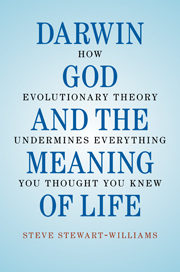 Darwin, God and the Meaning of Life
Darwin, God and the Meaning of Life 1 - Darwin and the big questions
Published online by Cambridge University Press: 05 June 2012
Summary
It may well be that for posterity his name will stand as a turning point in the intellectual development of our western civilization … If he was right, men will have to date from 1859 the beginning of modern thought.
Will Durant (1931), p. 22Because all organisms have descended from a common ancestor, it is correct to say that the biosphere as a whole began to think when humanity was born. If the rest of life is the body, we are the mind.
E. O. Wilson (2002), p. 132I simply can't stand a view limited to this earth, I feel life is so small unless it has windows into other worlds. I feel it vehemently and instinctively and with my whole being.
Bertrand Russell, cited in Ray Monk (1996), p. 248Why are we here?
Evolutionary theory answers one of the most profound and fundamental questions human beings have ever asked themselves, a question that has plagued reflective minds for as long as reflective minds have existed in the universe: why are we here? How did we come to exist on this planet? In a lot of ways, this is a very ordinary planet. It orbits an ordinary star and is part of an otherwise ordinary solar system, which is part of an ordinary galaxy, one of billions of galaxies in the visible universe. But in another way, this planet is very strange, because a small proportion of its surface has somehow transformed itself into life.
- Type
- Chapter
- Information
- Darwin, God and the Meaning of LifeHow Evolutionary Theory Undermines Everything You Thought You Knew, pp. 1 - 18Publisher: Cambridge University PressPrint publication year: 2010


